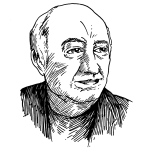“Ya know what I mean?” Dave Hickey likes to ask. His voice is gentle and lyrical, slightly tarnished by smoking, and very Southern. At sixty-seven, he remarks, guffawing about his large proportions, “rap has sort of reasserted my body type.” He’s often in a Lakers cap. As much as he likes talking, he will often interrupt himself to ask a question: “So what sort of music do you like?… What’s your plan in life?… Why in the hell is it called the Believer for?”
It’s hard to gauge the place of art critic Dave Hickey in the world. Though very well known, he’s not yet required reading—but that’ll change. His passions are idiosyncratic, he drives at no major thesis, nor is he seeking a revolution in taste or even acolytes. It seems he wants to construct an edifice of true things—or, at least, the least likely wrong things—that can be said about whatever subjects are most interesting and at hand.
Hickey is the author of a story collection and two books of essays, including the classic Air Guitar: Essays on Art and Democracy (1997). He began his career in the 1960s as a freelance journalist, but in the early ’90s, he moved to Las Vegas and joined the faculty of the University of Nevada in the art department. Now he teaches English. He’s run galleries in New York and Austin, and was executive editor of Art in America. Six years ago, he was awarded a MacArthur “genius” fellowship. Hickey counts among his “professional acquaintances” Lester Bangs, James Wolcott, and Hunter S. Thompson (“the puritan do-gooder”).
He writes of his beginnings, “That was the seventies—limos, homos, bimbos, resort communities and cavernous stadiums… the whole culture in a giant, Technicolor Cuisinart, whipping by, and I did love it so.”
This interview took place in two locations: the patio of a breakfast spot in Toronto around noon on a sunny midsummer day, where he ordered eggs and several coffees and waited a long time for a fork. After speaking there for a couple of hours, it continued in a hotel bar, where he could smoke in the courtyard.
His manner is a mixture of courtly and cowboy. It’s easy to imagine him pissed off and unhappy, but he is not the curmudgeon his reputation suggests. For at the root of everything Hickey writes about and speaks about is an advocacy for what he loves—and a kind of regret, not bitterness, at the popularity of what he doesn’t.
At the end of our meeting, he said, with a hint of resigned gallantry, “Please feel free to use whatever I’ve told you, as you wish. It’s not...
You have reached your article limit
Sign up for a digital subscription and continue reading all new issues, plus our entire archives, for just $1.50/month.
Already a subscriber? Sign in





